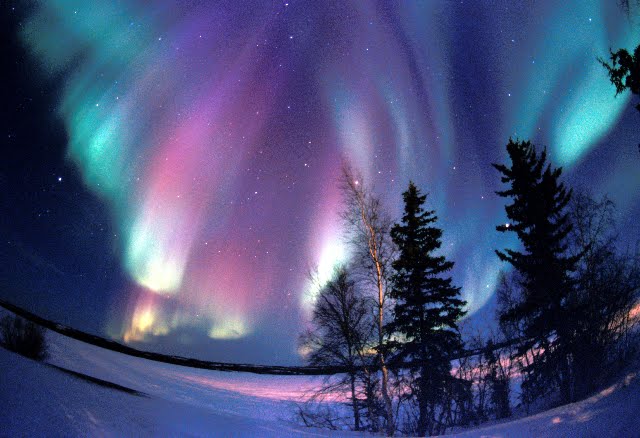
Excerpted testimonies from two articles – “Audibility of the Aurora Borealis” by David Pentland and “Can You Hear the Aurora?” by B.W. Currie – published in The Musk-Ox (no. 22, 1978) which I found in the free pile at the Yellowknife Public Library.
David H. Pentland, 1978:
No doubt many readers of this journal can add experiences of their own. Indeed, almost every northern resident I have asked has either heard the aurora personally or is firmly convinced by the reports of trustworthy friends that such sounds occur.
In the face of this body of evidence it is frustrating to find that many professionals refuse to admit even the possibility of audible auroras. […] Almost every discussion points out that the noise (if it exists) cannot derive directly from the aurora itself, and since there is no agreement on possible mechanisms to transmit the effects of the aurora closer to ground level, scientists seem to prefer to deny the existence of the phenomenon.
Carl Störmer, 1955:
There is no doubt that under special conditions with a fine auroral corona overhead certain sounds can sometimes be heard. The nature of this phenomenon is unknown. As the aurora on the two occasions was about 90 to 100 km overhead, the sound could not come directly from this, but must have been a secondary phenomenon: perhaps some sort of electric discharge in the neighbourhood of the observers caused by the enormous amount of electricity accumulated in the region of the aurora.
Sophus Tromholt, 1885:
It is described as of various natures, viz, cracking, whizzing, and hissing, from nearly every part of the world where the Aurora Borealis is visible, and the faith in the “sound” is as orthodox among the Eskimo of Greenland and the Lapps of Finmarksen as the Tchuetches of New Siberia. Even Captain Dawson and his party, the English party taking part in the First International Geophysical Year 1882-83 at Fort Rae on Great Slave Lake, assert that they distinctly heard the sound one night when passing up Great Slave Lake.
Well, the remarkable part of this question is, that all other scientists, who have sojourned for a length of time in northern regions have never heard the slightest sound which could with any amount of certainty be ascribed to the Aurora Borealis.
During my stay at Koutokae I was daily surrounded by people who believed as firmly in the sound as in the Holy Gospel.
Edward Chappell, Churchill, 1817:
The Cree Indians inhabiting Hudson’s Bay, and indeed the European traders there, maintain, that, in the serene stillness of their severe winters, a soft rushing noise constantly accompanies these coruscations, like that which is occasioned by the quick waving of a fan, or a winnow.
David Thompson, Reindeer Lake, winter 1796(?):
In the rapid motions of the Aurora we were all perswaded we heard them, reason told me I did not, but it was cool reason against sense. My men were positive they did hear the rapid motions of the Aurora, this was the eye deceiving the ear; I had my men blindfolded by turns, and then enquired of them, if they heard the rapid motions of the Aurora. They soon became sensible they did not, and yet so powerful was the Illusion of the eye on the ear, that they still believed they heard the aurora.
Samuel Hearne, Lake Athabasca, 1795:
I can positively affirm that in still nights I have frequently heard the northern lights make a rustling and crackling noise, like the waving of a large flag in a fresh gale of wind. This is not peculiar to the place of which I am now writing, as I have heard the same noise very plain at Churchill River: and, in all probability, it is only for want of attention that it has not been heard in every part of the northern hemisphere, where the lights have been known to shine with any considerable degree of lustre.
+
Photo by Tessa Macintosh.
Originally published on Lemon Hound, October 2010.